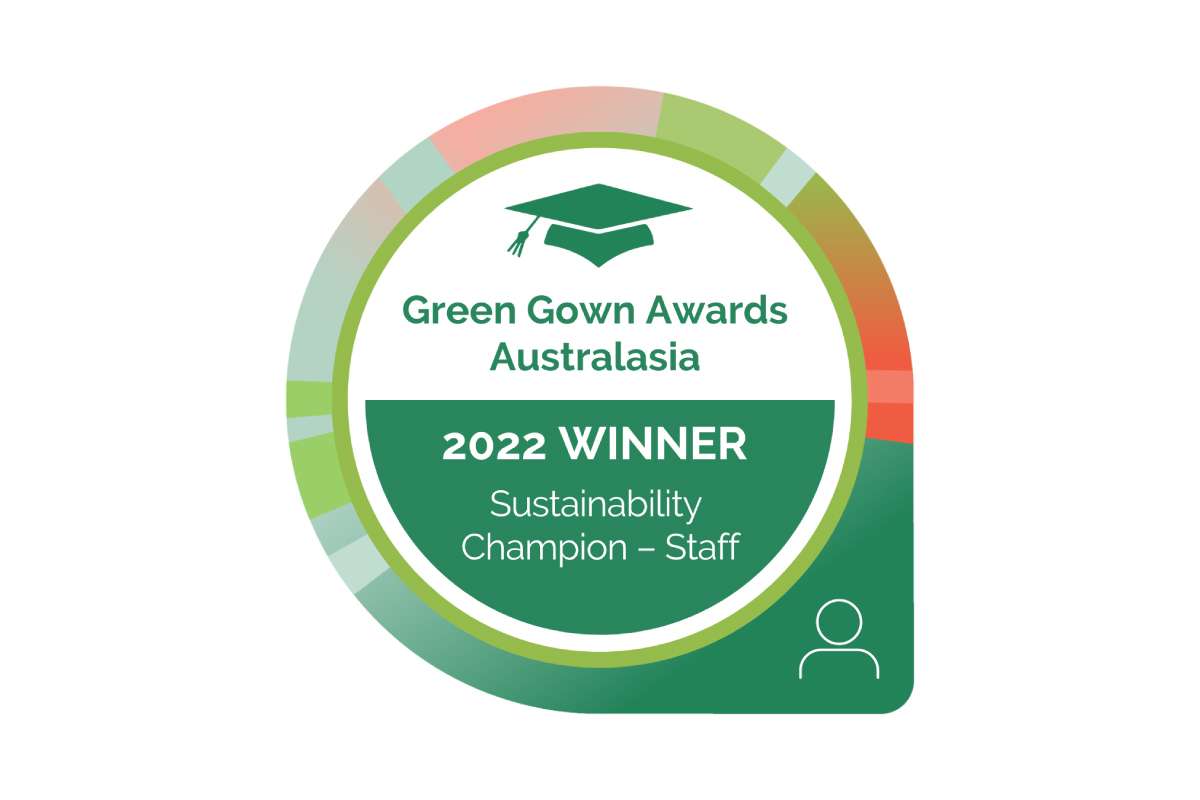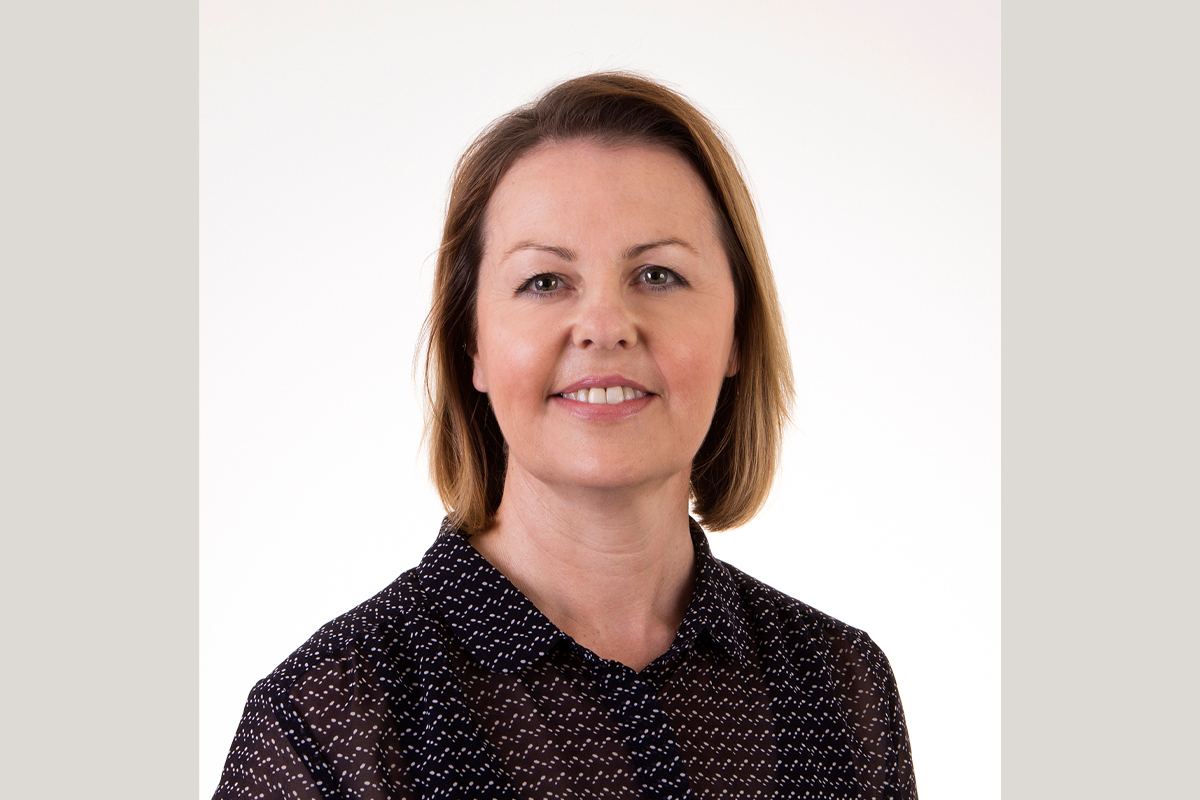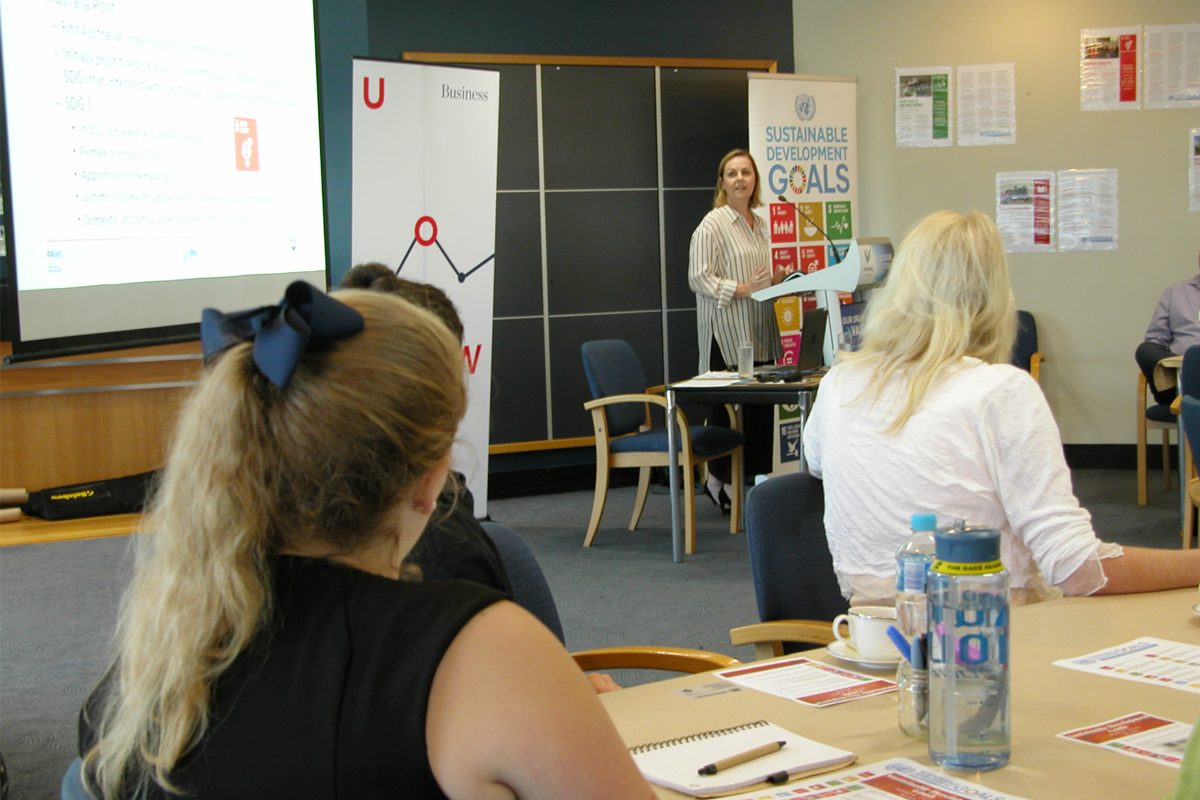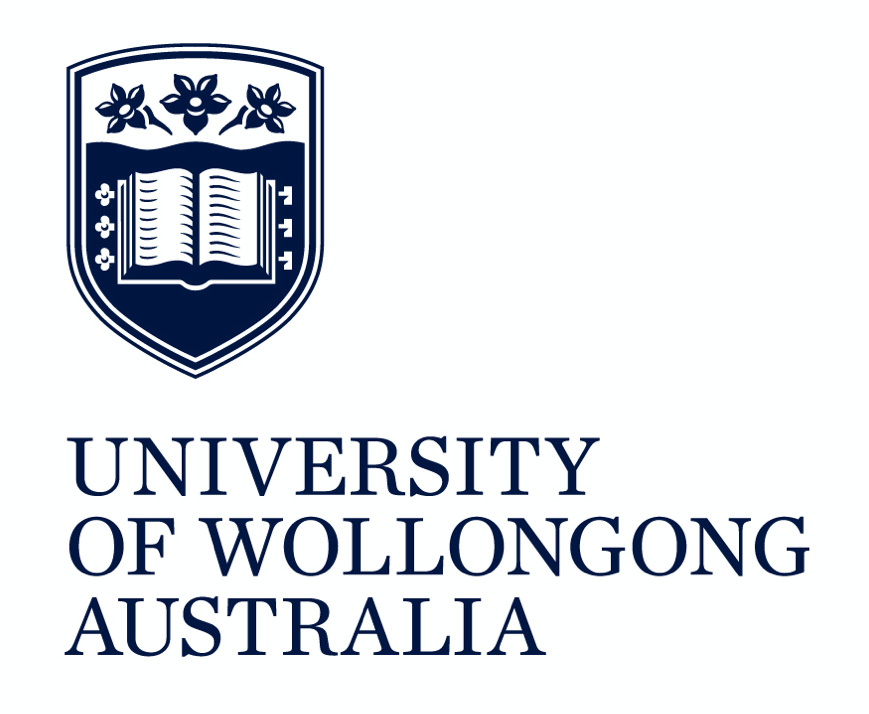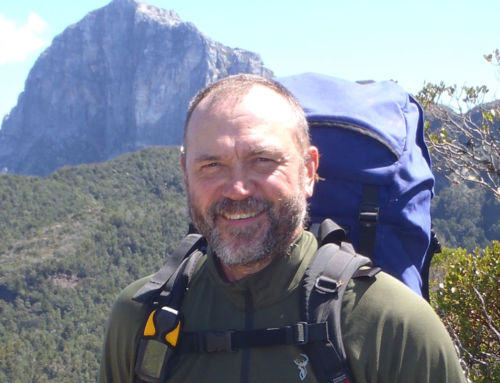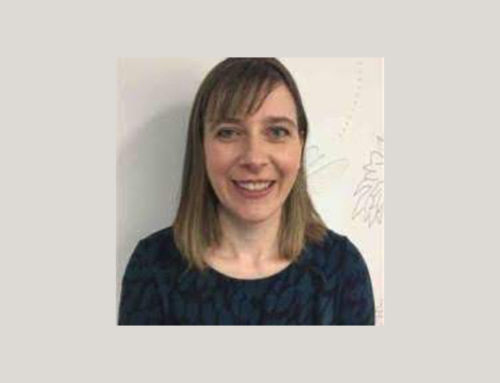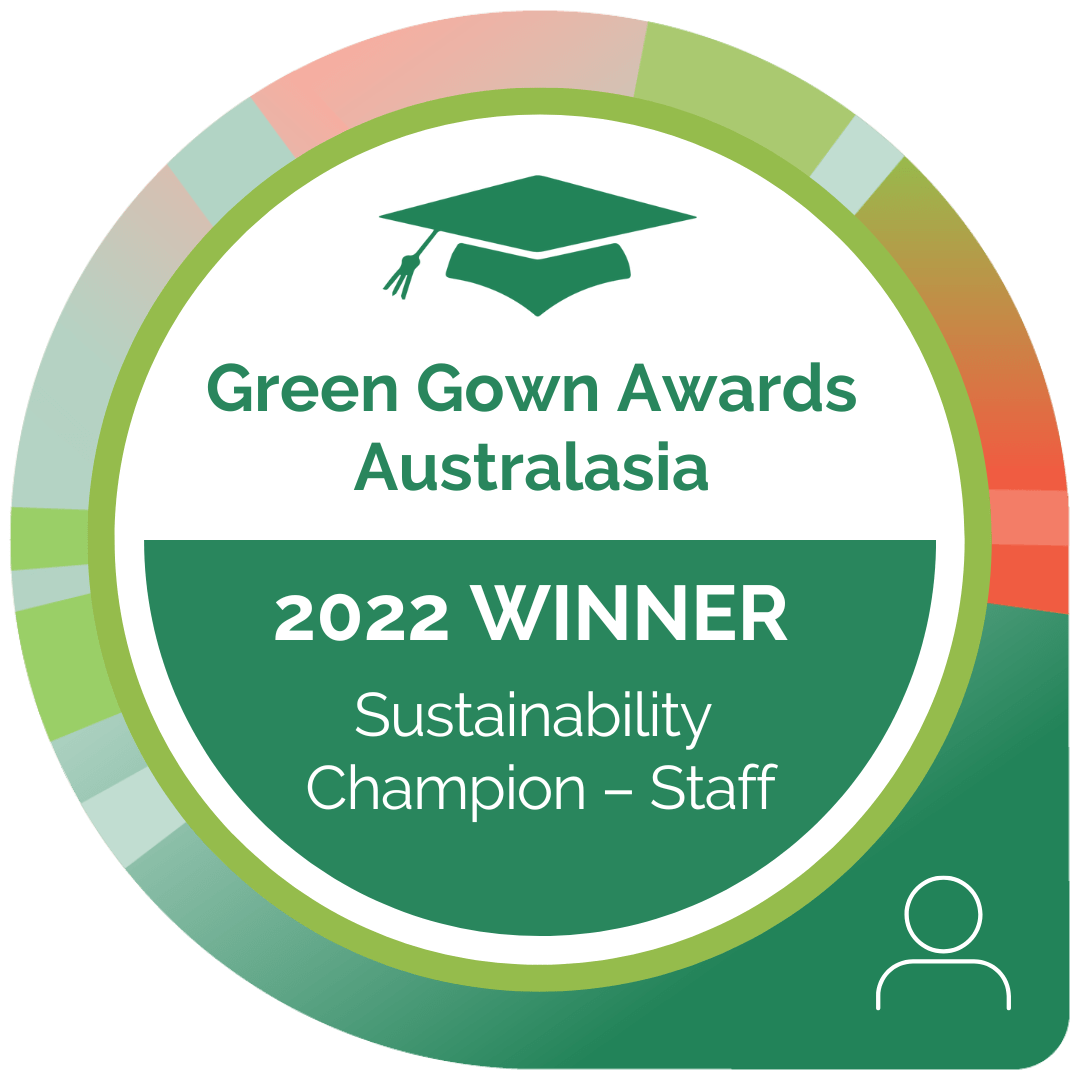
University of Wollongong
My case for receiving the individual Staff Champion Green Gown award is founded upon my significant and sustained focus on advancing ideas and approaches to incorporating sustainable development across the higher education sector and wider positive societal impact. My actions are distinctive because I have delivered several social and environmental sustainable development initiatives that have had significant positive effects on peers – through my Principles for Responsible Management (PRME) leadership, my institution – through my action for realising the Sustainable Development Goals, students – through my sustainable development dialogue and my local community – through cross-sectoral partnerships within the community. I have initiated these actions above my normal job requirements creating meaningful change and inspiring others to push the boundaries to transform into a sustainable future.
> A closer look
Leadership
I have been privileged to chair the Australia and New Zealand Chapter of the United Nations Principles for Responsible Management Education (PRME) institution for the past two terms, from 2016 to 2021. With a vision to realise the sustainable development goals through responsible management education, over six years my authentic and inclusive leadership increased the collaboration, trust and impact of PRME signatories evidenced in peer feedback; ‘You have been a fantastic leader of the group and overseen the growth and capacity of all members’ (PRME member). My actions include the establishment of a AusNZ Steering Committee, annual forums, state-based working groups, monthly well-being check-ins during COVID lockdowns and the instigation and organisation of an Eastern Hemisphere session as part of the PRME Global Forum in 2020 where students and colleagues from Australia, New Zealand, India, Malaysia, and the Middle East were able to share their scholarly work, network and listen to key speakers in regards to sustainable development at a time-zone favourable to these locations. This was the first time the Eastern Hemisphere time-zone had been considered during a PRME Global Forum. These initiatives continue today and are internationally recognised; ’Belinda, I am so grateful that you make this happen. I am absolutely looking forward to listen to a new ‘push’ from the Eastern Hemisphere on what are the next important milestones for us to aim for’ (Mette Morsing, Head PRME). In this role, I am especially proud of the relationships I built with the Sustainable Development Solutions Network (SDSN) and the Australian Campuses Towards Sustainability (ACTS). Working on a two day virtual forum in 2021 on ‘Accelerating Education for the SDGs across HE institutions’ was the first time our three networks had collaborated. These positive relationships continue with the new AusNZ Chapter Chair.
Dialogue: Outside of PRME, I exemplify my subject expertise at international education dialogues strengthening Australia’s education and training relationship with key stakeholders in the ASEAN region. This includes the ASEAN Australia Education Dialogue (AAED), a track II diplomacy platform, where I was an invited key panellist for ‘Implementing the United Nations’ Sustainable Development Goals 2030 in Community and Education Ecosystems’. I was also selected to present a virtual Masterclass in collaboration with the Australian Trade and Investment Commission (Austrade) India on the ‘What, Why and Who of the United Nations Sustainable Development Goals’ as part of the Study Australia Masterclass Series.
Partnerships: I began working with Healthy Cities Illawarra (HCI), a not-for-profit organisation, in 2017 because of a common interest in raising local awareness of the SDGs across our region. Our collaboration led to two successful intersectoral workshops. I organised, presented and was MC for the first workshop in 2017 which saw over 100 cross-sectoral attendees attend ‘Unpacking the United Nations Sustainable Development Goals Breakfast’. In conjunction with HCI and a successful research grant of $10,000, I organised a key speaker from the Australian Center for CSR (ACCSR), a cross-sectoral local panel and an engaged Q&A with the Mayors for both Wollongong and Shellharbour local councils. Satisfaction was high, evidenced by an evaluation survey completed by 61% of participants and positive feedback ‘While the content was fantastic the key take away for me was the networking opportunities that were available in the room, it was an exceptionally diverse group!’ (Workshop 1 attendee). Early in 2018 a second workshop was held ‘We’re all in this together: Pursing the SDGs in Wollongong & Shellharbour’. An intersectoral audience attended a facilitated round table discussion held at the Wollongong City Council building providing diverse groups of local participants the opportunity to share, learn from each other and explore SDGs relevant to their organisation.
Another exciting partnership is with iAccelerate, a unique business accelerator and incubator that educates and supports start-ups with their entrepreneurial ideas. Since 2019 I have given time to iAccelerate to incorporate an SDG education session into their 12 week foundational skills program. The session helped entrepreneurs align their ideas with the SDGs and understand how their ideas impact the worlds largest challenges. This work has further developed into a blended learning SDG module with an asynchronous module that is used as pre-work and a synchronous SDG in-class module. To track impact a self-reporting tool was developed to understand and measure how resident companies align with the SDGs. SDG reporting is now a mandatory part of participating in iAccelerate’s program.
Institutional
The anniversary of the UN SDGs takes place on September 25th each year. At this time, the global initiative ACT4SDG takes place across the world. On this day, for the past 4 years, I have instigated a whole-of-university cross-disciplinary student challenge event, utilising the SDG framework. This initiative has expanded from a 4 hour one-off SDG problem-solving challenge event in 2018 to a three week program tackling industry set challenges that finalised in a pitch collaborating with iAccelerate in 2019. Expanding in 2020 and 2021, in collaboration with UOW Student Life, the event took place online and reached out to our international students in Australia and overseas. The multidisciplinary experience was a recurring theme coming from students; “I am absolutely delighted to meet, brainstorm and work with such as diverse and creative team to innovate viable solutions to make earth more sustainable and healthier” (Student Testimony) and industry partners appreciated the collaboration; ‘Thanks so much for your vision and leadership in spearheading this effort’ (Aly Khalifa, Director Plastic Collective). Organising a whole-of-university event was initially challenging as many people questioned how I would bring students from different Faculties together but the University supported the event and each Faculty shared the marketing material to let students know about the initiative. Attitudes towards interdisciplinary experiences are popular today but not so common in 2018. I was very excited to be running with this initiative which has seen over 200 students engage in an interdisciplinary sustainable development challenge.
> Impact and benefits
I strive to be inclusive, holistic and experiential in my day-to-day actions resulting in benefits that transform well beyond my normal role and operational accountabilities, creating systemic change to make a positive difference in society. The above actions have led to the following impact and benefits:
Leadership: The impact of my PRME leadership led to the AusNZ network being granted ‘Established Chapter’ status in 2017, signing the Memorandum of Understanding at the 5th AusNZ PRME Forum. Our annual forums have always proved to be a time for celebration, sharing, learning and networking with event themes that enable benefit members through rich discussions. From ‘inspire, motivate, engage & act’ in 2017, ‘Beyond Business as Usual’ in 2018 and ‘Students as Partners’ in 2019, I have always strived for inclusivity with attendance from students and industry partners. Over the time of my leadership, PRME signatories grew by 37% to currently 39 higher education institutions joining the PRME Australia and New Zealand network. It is worth noting that 73% of all Australian universities and 63% of all New Zealand universities are now PRME signatories. My actions contribute to the recognition that business schools play a major role in cross-sector collaboration to ensure we leave our world in a better place than what we found it. Another impact of my PRME leadership was an invited member on the PRME Interim Management Council and a consequently elected member on the newly established PRME Board and Nomination and Governance Sub-Committee working with other PRME board members on the creation of the UN PRME Governance & Board Terms of Reference. These actions are significant in ensuring the transparent governance of the PRME Board and benefit Eastern Hemisphere business schools by ensuring their voices are heard in the strategic direction of responsible management higher education.
Dialogue: The impact of my international speaking opportunities led to over 150 students from India, Sri Lanka and Bangladesh engaging and discussing thoughts on sustainable development with the benefit of gaining an ability to take a SDG lens on the world as we moved through the global pandemic crisis during May 2020.
Partnerships: The impact and benefits of my partnership with HCI have been significant and unfolded over the past seven years:
- The SDG workshops led to both Wollongong and Shellharbour local Councils integrating the SDGs for the first time into their Community Strategic Plans (CSP). This is significant and beneficial for local communities in these regions as the CSP sets out the community’s vision for the future and the strategies in place to achieve it. Aligning the CSP with SDGs ensures the local regions are working towards our world’s greatest challenges and the local communities are being made aware of the SDGs,
- During our work on the CSP, it became clear from working with Council that mapping the SDGs was time-consuming and complex. In striving to be able to create local change, HCI and I entered into a Partnership Grant for $20,000 to develop a local SDG dashboard. This grant enabled us to develop a manual SDG mapping process with Shoalhaven City Council as a pilot local council. The current manual process was then developed into a local council SDG mapping computer application in conjunction with the UOW SMART Infrastructure team and released late 2021. The link is accessible on the HCI website and is currently used by local councils in the region https://healthycities.org.au/sdg-localiser/ . The benefit of this online tool is that Councils can create multiple SDG maps and share these within the organisation, raising awareness and generating conversation surrounding sustainable development,
- Our partnership actions were recognised with an invitation to be a witness on the 2019 Commonwealth of Australia Senate inquiry ‘Foreign Affairs, Defence and Trade References Committee on the Sustainable Development Goals’. I was asked to present my knowledge on the SDGS in higher education along with my research on partnerships for the SDGs. My collaboration with HCI was documented in the final report; ‘Healthy Cities Illawarra (HCI) and the University of Wollongong have formed an intersectoral collaboration implementing the SDGs at the local level’ and ‘The committee heard that most local governments had a low level of awareness, apart from a few exceptions such as the Wollongong region’. A significant benefit of this impact is the inclusion of local governments in the Federal SDG discussion, the importance of intersectoral collaboration and the need for funding to support local coordination. https://www.aph.gov.au/Parliamentary_Business/Committees/Senate/Foreign_Affairs_Defence_and_Trade/SDGs/Report
Institutional
The #ACT4SDG event has received numerous media attention including local newspapers and ABC Illawarra Radio Morning Show speaking opportunities. This publicity has enabled a wider impact including:
- I have developed a University-wide general elective, BUS 200 Innovation for Global Goals, mirrored off the #ACT4SDG event. The benefit of a subject being developed is that the initiative will be resourced ensuring its sustainability in the future, and will be run starting from spring 2022.
- The design and development of a similar event for UOW College called ‘Project Unite’. I mentored colleagues at UOW College and they developed a SDG challenge program for 124 students across 18 countries; ‘Special thanks to Dr Belinda Gibbons who was instrumental in the design and delivery of the program’. Project Unite design was modified slightly as the students were high school age and had English as a second language. Project Unite has ran successfully for 2 years and excitingly since this event one of the attending high school students from Malaysia is now running a mini Project Unite for her school.
- The opportunity to volunteer as a mentor with secondary school, Edmund Rice College as they work towards growing the awareness of sustainability throughout schools. The HSIE Teacher and Sustainability Facilitator at the High School contacted me after reading about the #ACT4SDG event and since 2019 I have worked with students to organise a private and public school annual sustainability conference. Each year the event and student leadership has grown to the point where in 2021 I reviewed the agenda and attended the event but it was organized and led solely by the students alongside the creation of a cross-school ‘sustainability network’ that meet bi-monthly to share and discuss sustainability in their schools. My partnership with the school is recognised by the student action and also teacher feedback; ‘I am looking forward to catching up with you and please remember without you this would never have happened’ (Diane Schodde, HSIE Teacher & Sustainability Facilitator, Edmund Rice College).
> Leadership and engagement
My holistic mindset and ability to work within and external to the University has had and will continue to have significant impact on transforming our society and environment for sustainable development. My actions are distinctive because I have delivered several social and environmental sustainable development initiatives that has had significant positive effects on peers (PRME Leadership), my institution (#ACT4SDG), students (SD Dialogue) and my local community (Partnerships). I have initiated these actions above beyond my normal job requirements, above my workload allocation and outside formal requests. To create meaningful change, my philosophy resdies in stepping outside my comfort zone and pushing the boundaries of what is considered normal practice. I am fortunate to work in an institution that encourages this innovative practice and recognises creative impact.
My passion for sustainable development started in 2015 when I was nominated to be the Australia and New Zealand Chapter Coordinator for PRME and to be honest it wasn’t a highly contested position. Each university was doing its own thing around sustainable development and the Global Goals were so holistic that they took people out of their discipline. We needed to come together and share but interdisciplinary action was not popular in higher education at the time. Collaboration between Universities 6 years ago looked a lot different to what it does today. My distinctive leadership and engagement practices are built upon systemic approaches that bring people together and in turn their Faculties and external networks – relationships that continue today.
Internally within my management discipline, I found myself questioning how we would ever realise the SDGs if they were only talked about and actioned in the Business Faculty and within the PRME network. I reached out to some local not-for-profit organisations, one of which was Healthy Cities Illawarra, starting a partnership that continues to remain strong and responsive to community needs five years later. My decision-making ability is founded upon an all-inclusive style that stresses the necessity for cross-sectoral multistakeholder involvement. This can be complex and complicated at times with so many different lens to consider but essential to make the changes we need for a sustainable future.
My knowledge on sustainable development is not unique but the time I give to sharing it is very unique. On average, I present on the Global Goals 2 times a month within faculties, schools, industry and not because it’s in my workload but because it makes my heart feel full. I was always told in my career development or mentoring sessions to find your specialty, the thing that you will be known for in higher education. I never set out to do that with the SDGs. They provided me with a framework to connect people and make change. That’s what I love to do – its what I have always loved to do. I follow my heart, my decisions align with my values and I teach, research and collaborate with people in areas that inspire me to be more and in turn inspire others.
My actions are distinctive because they are inclusive and systemic, creating ongoing change.
> Wider societal impact
My actions have a significant wider social impact. Many of these effects are detailed above in the impact section including the partnership action and benefits of engaging with Healthy Cities Illawarra. The importance of these relationships is central to my application as it has led to greater social and environmental impact including working with Food Fairness Illawarra (FFI).
I started working with FFI as part of my collaboration with Healthy Cities. FFI are a community coalition that works together to make healthy and sustainable food affordable and accessible for all. With my business background and passion for sustainable development, I led the successful revision of their strategic plan helping to ensure this amazing community work remained aligned to their vision amongst a changing world. This work was recognised in the FFI strategic plan ‘Food Fairness Illawarra would also like to acknowledge all involved individuals for their hard work on behalf of Food Fairness Illawarra and contributions to the development of this Strategic Plan, with special recognition to Belinda Gibbons from UOW Business School for facilitating the strategy sessions’ (FFI Director). I was invited to be a member on the FFI Steering Committee in 2020 and while the actions of this group contribute to community connections through events and education sessions, it was during the pandemic that the importance was validated. During the pandemic the FFI Steering Committee worked hard to develop a Fair Food Directory and in particular, keep the ‘low cost and free meals’ section of the website updated. I provided input to these projects and took a lead role in linking FFI to the work that UOW was undertaking at the time to support international and domestic students that were struggling to access healthy food. This work led to a FFI and OzHarvest meeting with UOW early in 2021 to discuss possible food waste initiatives that could occur together; ‘Thanks Belinda, I don’t think any Uni food outlets are donating food to OzHArvest at this moment in time, so could absolutely be worth a nudge’ (OzHarvest).
Wider impact from this work took place in May 2022 with an invitation for FFI to give evidence into the NSW inquiry into food production and supply as part of the Legislative Assembly Committee on Environment and Planning. I attended and spoke at the enquiry alongside the FFI Director, representing FFI and the needs of community https://foodfairnessillawarra.org.au/inquiry-into-food-production-and-supply-in-nsw/ .

